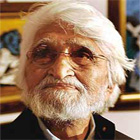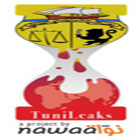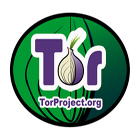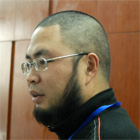Follow the Freedom of Expression Awards, Part II
by Silvia Duarte / March 23, 2011 / No comments
Index on Censorship has published the shortlist for the Freedom of Expression Awards 2011. The 11th annual Awards honor those who, often at great personal risk, give voice to issues and stories from around the globe that may otherwise have passed unnoticed.
This year’s ceremony, to be held tomorrow, will be hosted by broadcaster Jonathan Dimbleby at the Royal Institution in London, with a keynote speech by Booker Prize-winning novelist Howard Jacobson.
Award judges introduce the nominees in four categories: The Bindmans Award for Law and Campaigning, The Guardian Journalism Award, The Intelligent Life Arts Award and The New Media Award, supported by Google.
Yesterday Sampsonia Way presented the nominees for the first two awards; today we present the candidates for The Intelligent Life Arts Award and The New Media Award.
The Intelligent Life Arts Award
Gurpreet Kaur Bhatti
Gurpreet Kaur Bhatti is a British Sikh playwright and television and radio scriptwriter. Her 2004 award-winning play Behzti (“Dishonor”) met with controversy after its depiction of sexual abuse in a Sikh temple (Gurdwara) offended some members of the local Sikh community. Protests outside the Birmingham Repertory Theatre, where the play was to be performed, turned violent and the theatre canceled the run. Following death threats, Bhatti went into hiding and was given police protection.
Behud (“Beyond belief”) a sharp satire of censorship in modern-day Britain is Bhatti’s artistic response to the Behzti affair; it was staged in 2010, at the Belgrade Theatre, Coventry and Soho Theatre, London.
The play strikes at the tension between freedom of expression and faith groups’ assertion of the right not to be offended. It is testimony to Bhatti’s commitment to confront hypocrisy and fight for her right to freedom of expression in the face of hostility and potential risk to her personal safety.
Jafar Panahi
Iranian director Jafar Panahi has received international recognition for his films, which include The Circle, White Balloon — winner of a Camera d’Or at Cannes in 1995 — and the award-winning Offside, the story of a young female football fan.
In July 2009, Panahi was detained briefly after he joined mourners at the grave of Neda Soltan, the young protester who became an icon of the country’s “Green Revolution” when she was shot dead. He was arrested again in March 2010 and taken from his home to Tehran’s Evin prison. The international film community rallied, with numerous petitions and letters sent to the Iranian authorities demanding his release. He was released on bail in May. Last December he was found guilty of colluding against the Islamic republic and sentenced to six years in prison. He has been banned from traveling for 20 years and from making films for the same period.
MF Husain
Celebrated and critically-acclaimed Indian artist Maqbool Fida (MF) Husain has been battling against censorship in his native India and elsewhere for close to 20 years. Born in 1915, he is recognized as one of India’s greatest living artists. He has lived in exile since 2006.
Husain’s work has caused controversy in sections of the conservative Hindu community, who regard his depiction of Hindu gods and goddesses in the nude as blasphemous and offensive. Husain has received numerous threats and exhibitions of his work have come under attack on several occasions; in India, he has faced hundreds of legal actions relating to his work.
In January 2011, three of Husain’s artworks were removed from the Indian Art Summit in New Delhi following threats. Organizers said they could not guarantee the safety of the artwork or of those visiting the exhibition.
The New Media Award
TuniLeaks by Nawaat
TuniLeaks is a selection of the WikiLeaks State Department cables published by Nawaat.org, an independent group blog run by Tunisian net activists.
TuniLeaks, like its parent site Nawaat, is entirely independent and does not receive funds from any political party.
The TuniLeaks cables revealed the extent of the corruption deeply entrenched in many aspects of Tunisian life. Despite attempts to block the site, news of the cables being released swiftly spread around the country and Nawaat helped informal media networks link communities that had been cut off by government censors.
Nawaat highlights how important transparency is in a country like Tunisia, where citizens had for so many years been cut off from vital information and dialogue. “The aim is to get everyone to read, to get an idea and give meaning to the facts provided,” the website states. “The debate is open.”
The Tor Project
Tor enables whistleblowers, dissidents and activists to communicate safely.
It began as The Onion Router project in 2002, originally sponsored by the US Naval Research Laboratory. Among its founders are Roger Dingledine, Nick Mathewson and Paul Syverson.
Designed to increase privacy and security, internet users are able to access censored sites via a third party and conceal their browsing history. Communications via instant messaging are similarly protected. The Tor system is continuously updated and developed in order to address the vulnerability inherent within web-based systems. The software “does not modify, or even know, what you are sending into it”, the Tor site states. “It merely relays your traffic, completely encrypted through the Tor network and has it pop out somewhere else in the world, completely intact.”
The use of Tor technology in Egypt increased fourfold in the weeks leading up to the overthrow of Hosni Mubarak, and a similar pattern was seen in Tunisia.
Wen Yunchao
Wen Yunchao is a Guangdong-based internet activist. Writing for platforms including the now banned bullog.cn, Wen established himself as one of China’s best-known bloggers under the alias Bei Feng. He started his career as a news reporter before becoming the editor of Guangzhou’s Yangcheng Evening News website. In 2009, Wen left to research internet censorship. He has spoken about his work as a censor and member of the “50 cent” group (state-funded commenters paid 50 cents for every pro-government comment).
Wen now works to remove restrictions on information and champions freedom of speech. When Southern Weekly editor Chang Ping was fired in early 2011, Wen Yunchao helped spread the word, organising netizens to donate to Chang Ping’s account to show their support. He also organised Twitter’s “empty chairs” event to mark Liu Xiaobo winning the Nobel Peace Prize.
Wen was among the second group of signatories of Charter 08, the manifesto signed by more than 350 Chinese intellectuals and human rights activists.









